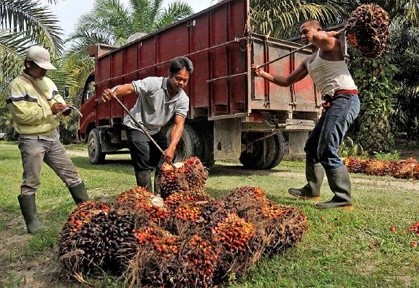Popular Reads
Top Results
Can't find what you're looking for?
View all search resultsPopular Reads
Top Results
Can't find what you're looking for?
View all search resultsTop palm oil growers go on defensive against EU curb threat
Change text size
Gift Premium Articles
to Anyone
A
s concerns about palm oil’s sustainability simmer in Europe, the world’s second-biggest grower is ramping up its defense of the most-consumed edible oil.
Malaysian Prime Minister Najib Razak and Indonesian President Joko Widodo will this week discuss concerns that a resolution passed by the European Union in April calling for tougher environmental standards for palm oil may hurt the industry. The two countries are the world’s top palm oil producers, accounting for 85 percent of supply.
“If such a resolution affects our exports, it will be a major blow,” Mah Siew Keong, Malaysia’s Plantation Industries and Commodities Minister, said in an interview in Kuala Lumpur. “Any form of discrimination is not acceptable, and we will be compelled to act if it’s enforced to protect our own interest.”
The European Parliament’s non-binding resolution urged the bloc’s executive arm to step up efforts to prevent deforestation as a result of palm oil production. The expansion of plantations in the two countries has seen farmers accused of illegally using slash-and-burn methods to clear land, destroying rainforests and habitats for animals, and causing a severe haze that can blanket parts of Asia. Indonesia has said it is ready to retaliate against further attempts to curb palm oil exports.
The European Union is Malaysia’s biggest export destination, accounting for about 13 percent of shipments of palm oil and palm-based products last year, according to the Malaysian Palm Oil Board. About 90 percent of Malaysia’s biodiesel exports also go to Europe, Mah said.
Mah met with 18 European ambassadors on Monday, according to a statement from the ministry. EU officials are consulting with stakeholders from palm oil producing countries and the resolution is being worked through European commissioners and the European Council before possible legislative measures are proposed, the statement cited Maria Castillo Fernandez, ambassador, and head of the EU’s delegation to Malaysia, as saying.
Indonesia’s president has asked the EU to end discrimination against palm oil as it harms economic interests. Palm oil is the country’s number one export commodity to the EU, representing 49 percent of the region’s imports, according to the EU. The industry helps alleviate poverty, narrow the development gap and develops an inclusive economy, according to Widodo.
Economic Lifeline
Farmers are the most vulnerable group, according to Mah. In Malaysia, there are about 650,000 smallholders who depend on palm oil as an economic lifeline and the ministry estimates another 3 million workers are involved directly and indirectly in the industry. While most of the large, listed plantation companies are certified by the Roundtable on Sustainable Palm Oil, additional stringent sustainability criteria “will be very detrimental” to the smallholders, he said.
Malaysia’s commercial palm oil industry began in 1917, with expansion supported as part of government measures to alleviate poverty by increasing agricultural output. Palm plantations began replacing rubber from 1961 and became Malaysia’s main economic crop in 1989. In terms of net exports, palm oil exceeds petroleum and electronics, Mah said, and makes up 4.3 percent of gross domestic product.










